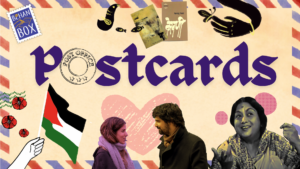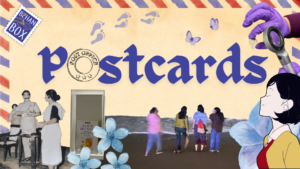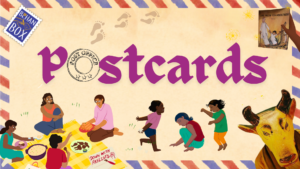Postcards: From Faiz’s Love Poems to ‘The Thursday Murder Club’
This month in Postcards: notes about grieving, friendships new and old, hearty khichdi, and more
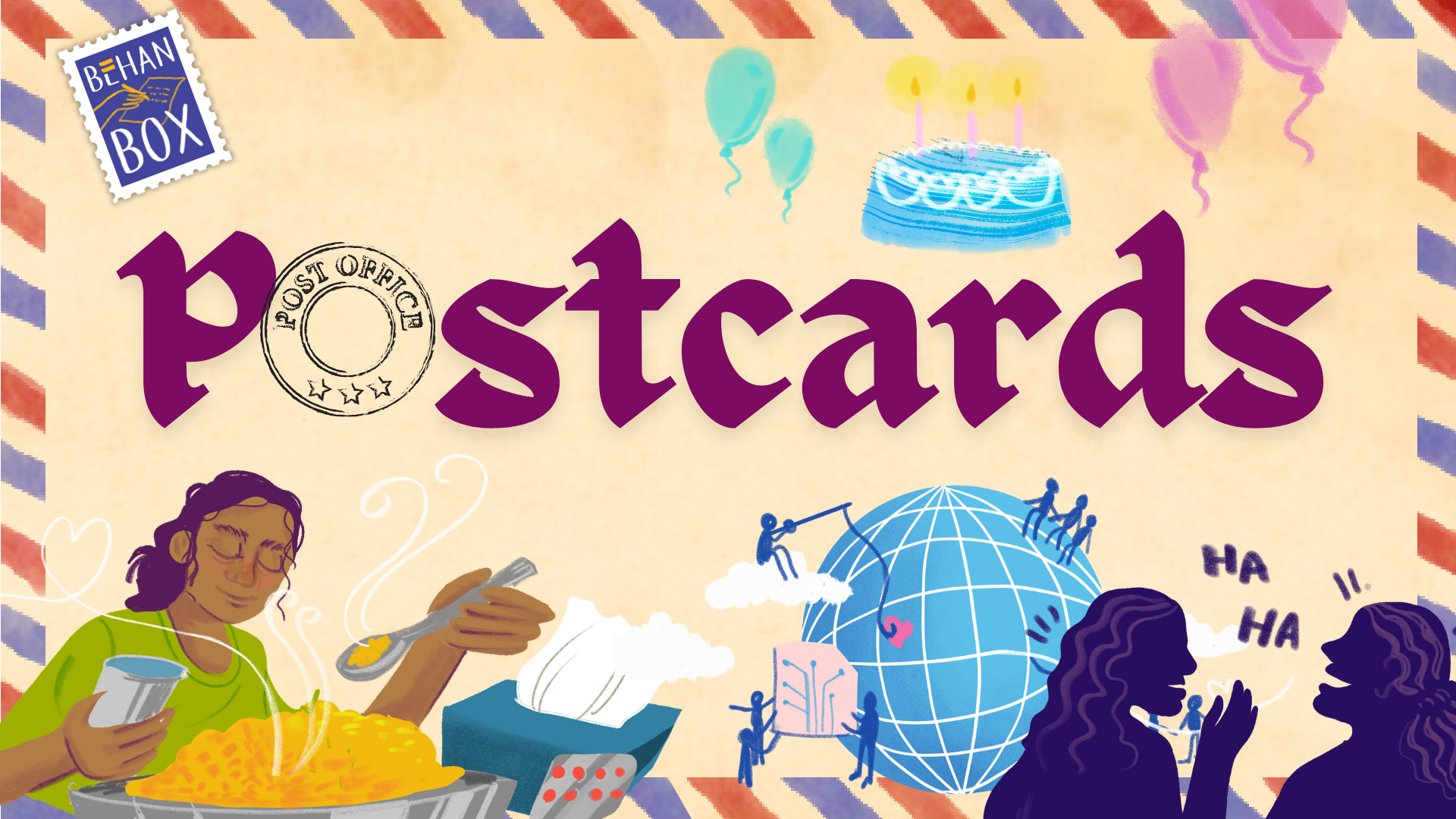
Dear reader, we write to you about the people, places, and ideas that brought team BehanBox joy this month. One postcard, every month. Subscribe here.
Khichdi, Care And Community
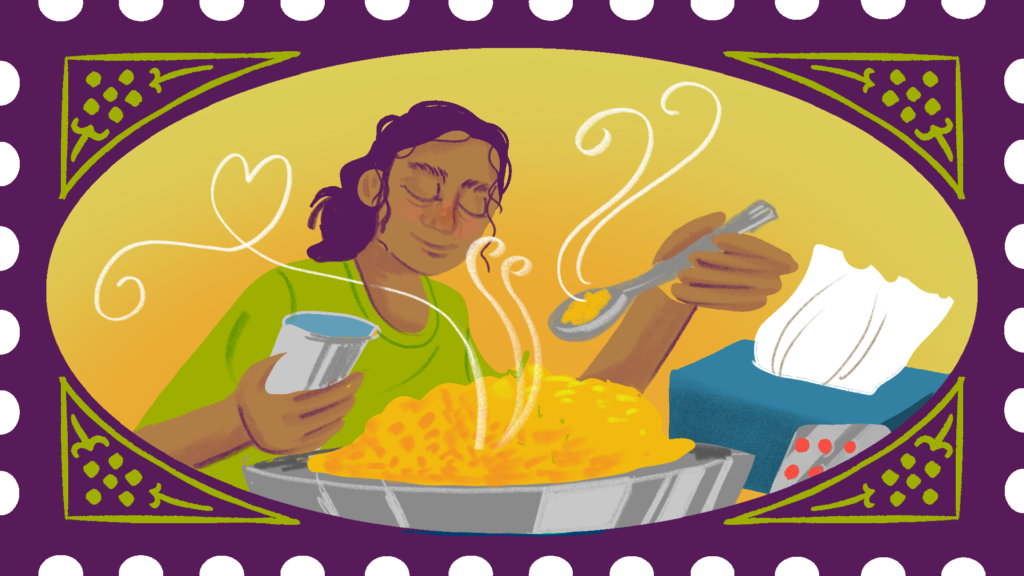
I ate a lot of khichdi this month, both out of necessity and a desire for warmth. Growing up, we ate a lot of it, sometimes with jackfruit or karaunji aachar, occasionally with a little ghee melting in, but mostly just a simple one with potato, seasoned with curry leaves and rai.
Khichdi was the quickest meal my mother could scrape together after a long day of work.
Sometimes, I find myself moving like my mother in the kitchen. I live alone, and in between work, seeing friends, bouts of sickness, and navigating change, khichdi has become one of the easiest, most affordable, no-nonsense meals. I notice myself going back to it for its possibilities.
Through khichdi, I reclaimed time. It was an intentional effort to slow down, enjoy simple flavours and learn to care for myself.
This month, my phone gallery is full of small, intentional moments of respite – vivid sunsets after work, embroidering in the park, tree barks and ants, raindrop ripples, snapshots from Pyaasa, and women walking together at midnight.
When life felt dreary and lonely, cooking and eating khichdi with friends brought warmth, spice and community. I learnt how to be cared for by my loved ones. I felt seen and I knew I was held.
When I called my mother for the recipe, despite knowing how to make it myself, khichdi became an excuse to mend relationships, with care.
Anjali

Murders And Post-Retirement Musings
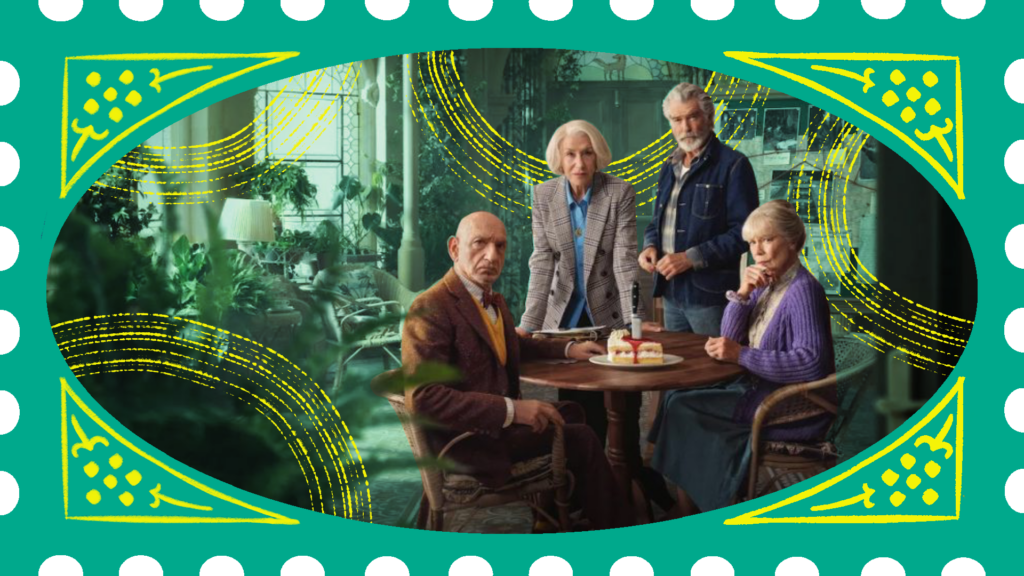
A friend and I have this ongoing dream about retirement. It involves moving to a commune, growing our own food, and running a Telugu fusion canteen and bookshop. We picture ourselves dishing out bento boxes packed with gunpowder arancini balls, miso rasam soup, avakaya onigiri, haleem katsu curry — and other as-yet-unnamed culinary experiments. Think: farm-to-table with a side of fiction and filter coffee.
Then I watched The Thursday Murder Club. It’s about four retirees in a ridiculously posh countryside retirement home who meet every Thursday to solve cold cases. There’s Elizabeth, an ex-MI6 agent; Ron, a former trade union firebrand; Ibrahim, a psychiatrist; and Joyce, a retired nurse who bakes stunning cakes and steals every scene with her dry wit. When a murder happens right in their backyard, Joyce squeals: “Now we’ve got a real case to solve. Isn’t it wonderful?” Then quickly adds, “Obviously RIP and all that.” It’s all a bit cheeky, a bit cozy-crime, but what stuck with me was their joie de vivre — sharp, curious, and absolutely thrilled to still be in the game.
Closer home, we have living examples of that same spirit. Romila Thapar and Irfan Habib, two towering historians of India, turned 94 this year. Irfan saab recently delivered the Sitaram Yechury Memorial lecture and appeared on a podcast. He still cycles around, I gather. Professor Romila Thapar still writes and speaks, and a friend tells me, spends two full months prepping for every lecture. That’s commitment.
And then there’s Professor Jagdeep Chhokar, who sadly passed away just last week. He was still fighting the good fight for electoral transparency — his last battle being a legal challenge to electoral irregularities in Bihar. Literally active until the end.
All of this — the dream communes, fictional detectives, and real-life heroes — has made one thing crystal clear to me. In retirement, I don’t just want to be relaxed or well-fed (though I wouldn’t say no to that); I want to be indefatigable. Still learning, still doing, still laughing.
Bhanupriya Rao

A Feminist Listens To A Faiz Poem, On Repeat
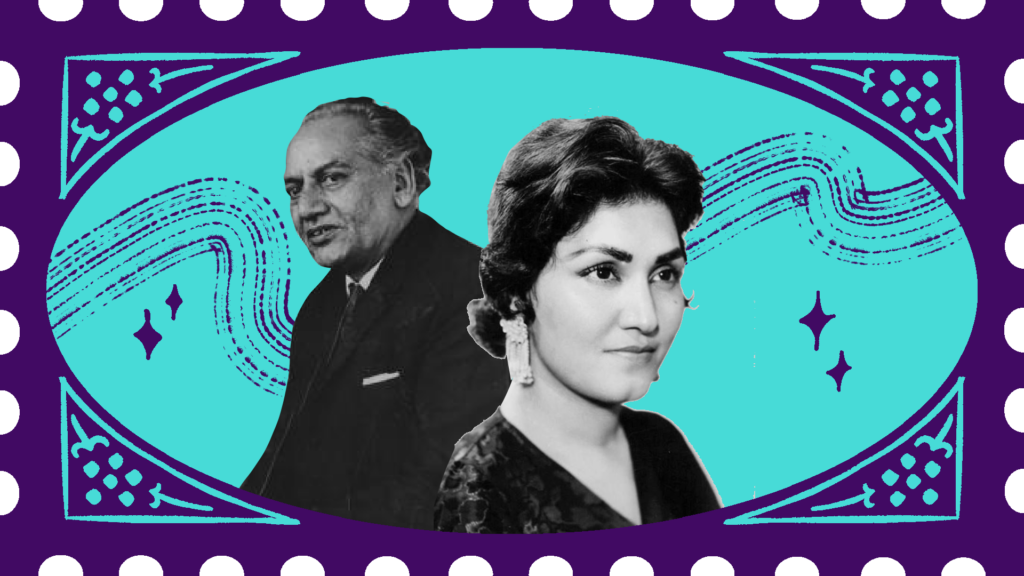
I suppose I have those ghostly things called algorithms to thank for this, little digital elves scurrying about reading my mind, listening to me talk, watching what I read and hear. For the last few days, they have been throwing a verse of Faiz Ahmed Faiz at me, from every corner. The eternal Mujhse pehli si mohabbat sung by Noor Jehan, gloriously open throated.
Though there is mohabbat right there in the fourth word of the verse, it is not a love poem as we know it. There are, Faiz tells the beloved, things bigger than this love of ours, the pang of parting, the angst of when we will meet again. There is also the oppression, the death of millions of innocents, the smell of blood and greed on the streets. But the political messaging never ever kills the romance. After all we have Faiz to thank for that immortal line in this nazm: Teri aankhon ke siwa duniya mein rakha kya hai? But, but, but…. (Incidentally, Majrooh Sultanpuri merrily lifted the one single line for Mohammed Rafi later.)
So moving was Noor Jehan’s rendition, Faiz, it is said, had abandoned his ownership of the poem – it was, he said, her song here on. I am listening to just about every version available, including the superb renditions by the great actors, Zohra Sehgal and Surekha Sikri.
But as much as I love this revolutionary nazm, every time I hear it, I must admit that the feminist in me is not a little riled: why is it always assumed women are impervious to the realities of the world and the men bear the burden of it?
Malini Nair

To The Future, With Hope
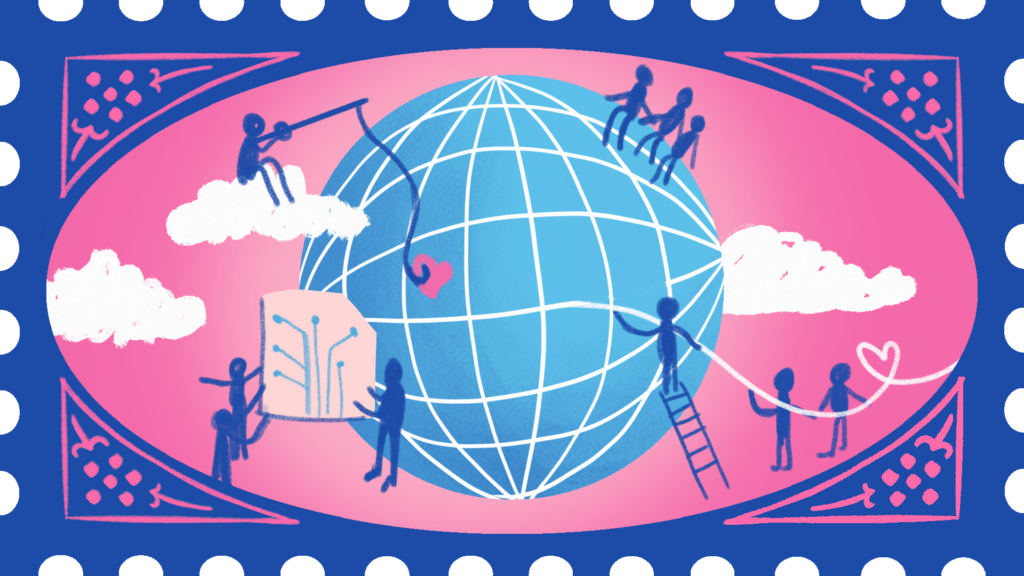
Two days into a workshop on technology-enabled violence, the organiser says this: “Because digital tools have created an unconscionable crisis, you need an imaginative daring to think of what may be possible. And never has since colonialism there been a need to rely on imagination.”
We dared and how. Last month I attended a workshop on images online and the harm they inflict on sex workers, trans people and gender minorities. It was an exercise in imagining futures. What if the internet were an equal space; if only Big Tech companies valued safety and kindness online. What would this look like, and how would we get there?
Leave it to a small group of activists, researchers, technologists, lawyers, and journalists. We stretched our minds to fantastical realms. An asteroid could destroy Earth and we would start afresh; or fast forward into the future where nudity does not carry shame. Also in discussion were one-of-a-kind kindness pills and brain chips made especially for TechBros™ (because you know). How free and freeing it was, to ditch reality for hopeful futures where money wasn’t the only incentive, where communities had a say. When we jerked ourselves back into the present, it dawned on us that no one looked at law and justice systems – from them accountability seemed a far fetched dream.
My mind relishes travelling through time, treading through What Ifs and If Onlys. But a sense of betrayal lingered, is spending time in the future taking away something from the present? Shouldn’t we try to solve immediate issues? But also, do we have to choose between what is and what should be?
Maybe when one time travels, one agrees to be both a realist and romantic. Besides, who doesn’t want to imagine a world where billionaires get a taste of their own medicine?
Saumya Kalia

To Old Friends And New

Of all my friends, I have known Sarah the longest. I have photos of her attending all of my childhood birthday parties wearing a signature red lipstick and I am sure there are random photos of me too in the photo albums at her home. When people ask me how we met, I inadvertently say that she is my “building friend”.
For the longest time, I have compartmentalised friendships into these neat baskets – ’school friends’, ‘building friends’, ‘college friends’, ‘work friends’. And each group came with a distinct kind of nostalgia. Every time we met, there was an unexplained need to rehash the same situations and conversations, and I found myself playing an empty caricature of the person I used to be.
As I grew weary and disconnected, I also found myself desperate for friendships where I can just be. And I found it on a lunar eclipse Sunday, in old friends and new. I met Sarah for the first time in a new city, Delhi, and as we walked through a mall, she randomly told me how excited she was for the eclipse because what if it takes her too 500 years in the past. I immediately laughed. I knew exactly what she was talking about, we were watching the same Korean TV show. We did not need to tell each other, we just knew.
After meeting her, I went back to my friend’s place where I was staying. I had barely met him five times but our friendship, which grew over terrace sunsets with green teas and bad jokes, was cemented over watching the eclipse, followed by another epic Alcaraz-Sinner match.
The next day, I realised how all my anxieties over friendships were disappearing, and I finally found spaces where I can belong.
Shreya Raman

Big Grief, Small Celebrations

What does grieving really look like? I asked myself this as I rushed to the stationery store, hunting down ribbons for my friend’s Pinterest-inspired birthday décor. Being the only art major in a group full of software engineers, I always knew I’d be the designated decoration person, and honestly, I didn’t mind. I just wanted her to feel special today.
A month ago, this idea would’ve seemed impossible. She had just lost her mother to prolonged illness. Grief had blanketed all of us, but especially her. We’d grown up together, so seeing her in that quiet, aching space was unbearable. Her relatives said a girl shouldn’t smile or celebrate during mourning. No birthdays, no laughter, no “loitering”.
She’d initially refused to mark her birthday at all. Eventually, even I stopped asking. But just days before, we somehow convinced her. If it couldn’t be at her place, we would do it somewhere else. And so the secret planning began. I gathered the supplies, the cake was smuggled into a friend’s house, and finally, she blew out the candle. It was worth everything just to see her smile.
Still, it felt upsetting that something as simple as joy could be seen as betrayal. That women are expected to grieve in silence and stillness, as though smiling is immoral. But maybe, just maybe, this small celebration was our first quiet rebellion. Our way of choosing happiness, on our own terms.
Urvi Sawant

What movie, book, art, sight or sound inspired you this month? Mail us your postcards at contact@behanbox.com. We’ll share your missives with our readers on social media.

Did you hear about The ASHA Story, the feminist archive we are building that documents the story of ASHA workers? You can contribute to it too. Write to us contact@behanbox.com.

We believe everyone deserves equal access to accurate news. Support from our readers enables us to keep our journalism open and free for everyone, all over the world.
